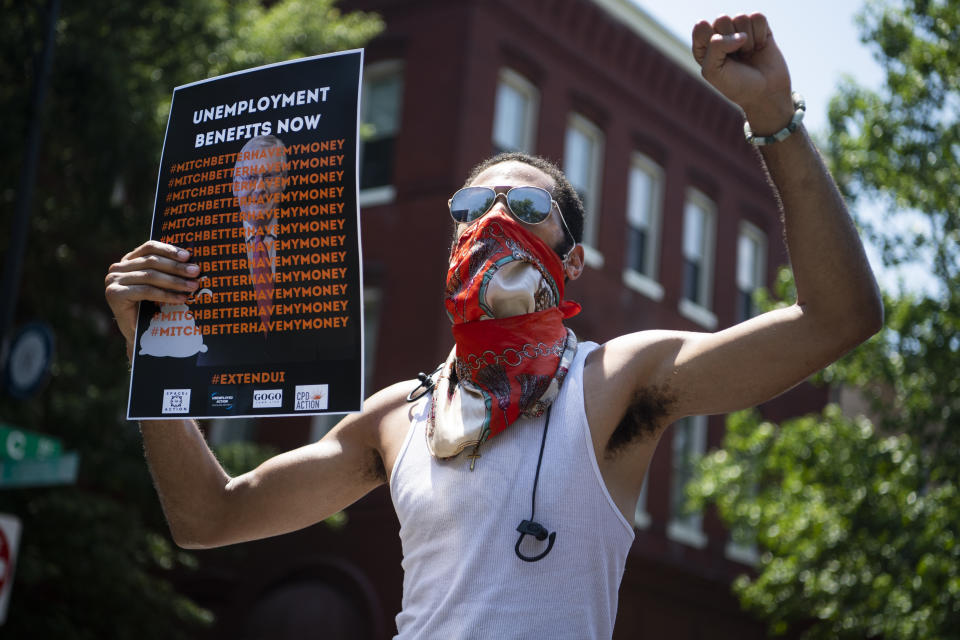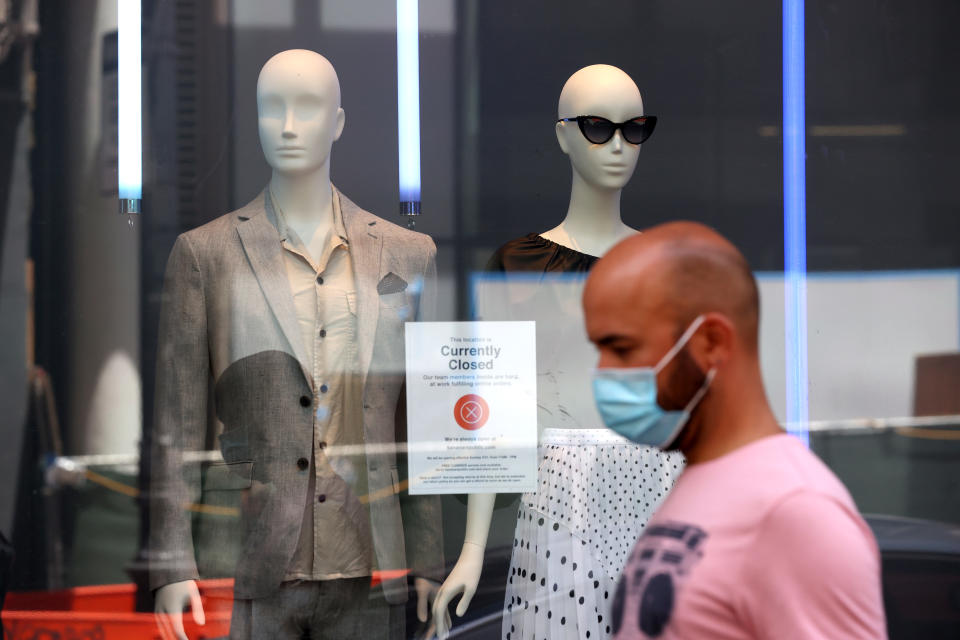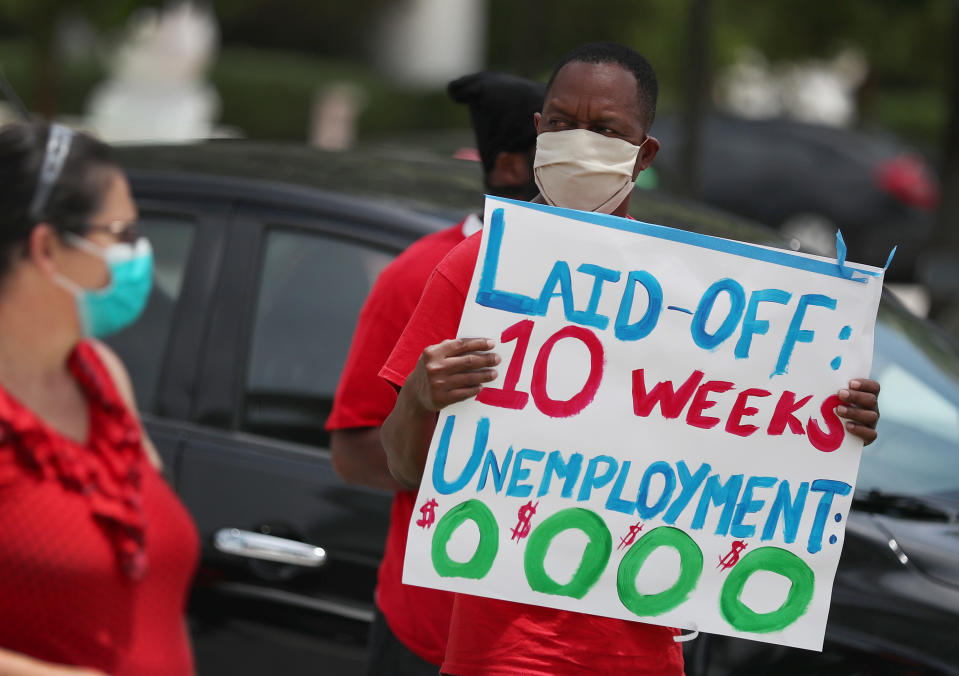Coronavirus: Everything you need to know about the extra $600 in unemployment benefits
Over 52 million Americans have filed for unemployment benefits since March 20, but millions of those who remain unemployed will soon see a big change in their benefit check.
Under the $2.2 trillion CARES Act signed in March, jobless Americans got a $600 weekly bonus on top of their regular unemployment benefits, which, in turn, has boosted personal income, supported spending recovery for low-income families, and even led to declines in poverty. But that benefit is set to expire at the end of July and Americans probably won’t see the full benefit extended.
Congress is still discussing what an extension should look like, but the extra $600 is likely to be reduced significantly. Experts worry that this may lead to personal incomes plummeting for many Americans, resulting in their inability to pay bills and cover basic expenses.
Cashay.com Editor Janna Herron sits down with Yahoo Money and Cashay reporter Denitsa Tsekova to better understand what is happening in the latest episode of the Money, Honestly podcast.
The podcast episode is based on recent reporting Denitsa has done for the Yahoo Money. The transcript is below.

Janna: Hi. This is Money, Honestly. I'm Janna Herron, and today Denitsa Tsekova, a reporter on my team at Yahoo Finance and Cashay, is joining us. We'll be talking about the extra unemployment benefits jobless Americans are getting during the coronavirus pandemic.
So, Denitsa, unemployment benefits have been in the news lately, but what people are talking about isn't the usual standard unemployment insurance people get when they are laid off. Can you explain what these coronavirus unemployment benefits are and how it works?
Denitsa: Yeah. So, there were additional $600 weekly as part of the $2.2 trillion CARES Act, which was passed by Congress at the end of March, and how that work is, you normally get your weekly benefits, which are, say, $200 or $300 or more, depending on a lot of factors, and then you get $600 on top of that. So, that was a really big lift for Americans, and the idea was to allow people to stay at home for that time during the pandemic and not really to worry about paying their bills and covering their expenses.
And that was a very specific U.S. approach. Some of European countries choose to keep people in their payrolls and the unemployment rate remain very low, while in the U.S., the unemployment rate was high, but people were given generous benefits. And in the last four months, we have had a really high number, 51 million people, applying for unemployment insurance and getting them at some point throughout the pandemic, and they got the $600, too.
And the other thing is, people continue filing unemployment benefits at pretty high rates. So, every week we get above 1 million, which is way above what you get at normal time, which is, like, 200,000, 300,000, and last week, we got 1.3 million people filing for them.
Janna: So, $600. That's a lot. I mean, if you think about it, $600 a week, that, roughly, is $2,400 a month. That's roughly... If I did my calculations correctly, maybe around $28,000 a year. So, that is a lot of extra money that people are getting. Now, what is the news on the $600? Why are people talking about it right now?
Denitsa: Well, they're set to expire on July 31st, which is not entirely true because people will stop receiving them around July 25th and July 26th. And we're not entirely sure that they're going to completely expire, but as it seems, of now, Congress just returned back from their recess and they're discussing a possible extension, but even with what we have so far, even if there is an extension, it will likely be a much lower extra to the benefits. So, we're hearing something like $200 a week. So, one third of what the additional benefits were.

Janna: Right, right. I actually, I just did the calculation. So, if you go 600 times 52 weeks, you get $31,200 for a whole week. I mean, a whole year. Of course, that's not what everybody's getting. It's on a weekly basis, and, like I said, these are very generous benefits. So, the question becomes, as Congress is debating whether to extend this, did that $600 really help people during the pandemic and keep them afloat?
Denitsa: Yeah. These were pretty generous benefits. People ended up... I think the replacement rate was 134%. So, you may have heard a lot about people are paying more to stay at home, and this was the case for many Americans, of course, for a temporary period of time.
Two in three Americans who got the additional $600 were earning more while employed compared to their prior wages, and this really made a difference. Personal income rose by 10% in April, which was a big surprise, because we have that recession, public health crisis, and still, incomes are going up. So, this was driven by stimulus checks, but also unemployment benefits, and in May, where it was driven primarily by unemployment benefits, personal income also remained above pre-pandemic level.
So, we see, also, more people getting a living wage, which is the minimum income you need to meet your basic needs, and we did a few stories on that. We spoke to people who make more through those benefits and they feel much more positive about their personal finances. They were telling me that, "We are finally able to pay our bills on time. We're actually, for the first time, are putting some money aside for savings." And some of those people, a lot of the people we spoke to, they were just returning to their job and they were kind of worried that they're returning too early and the public health crisis is still ongoing, but obviously they had to give up those benefits.
And then another very surprising effect is that...that the poverty level actually declined during those months, and over 60 million people were lifted off poverty, which is one of the largest declines we've seen in the last 20 years, and this all, personal income going up, poverty going down, is happening in a recession, which is quite unusual.
Janna: Absolutely. Wow. That's not what you would expect. And I did hear the CEO of Synchrony Bank, which owns those credit cards that you get from retailers, like the Gap card and stuff like that, was even saying how she was surprised that people hadn't missed payments like they would in a regular recession. So, you also were seeing people, like you said, able to pay their bills maybe even better than before because they were getting a little bit more money.
So, that comes to my next question. So, what happens if this really generous extra $600 a week unemployment benefits doesn't get extended by Congress? What can we expect to happen to these people? What do you expect to see?
Denitsa:
Well, the predictions, I have to say, are pretty gloomy. The benefits are set to expire, as I said, July 31st, but we may see people losing a big chunk of their income July 25th, and when I say a big chunk of their income, a lot of the economists I spoke to say that people will see 50% to 75% of their income disappearing overnight. This is, if the benefits don't get extended. So, imagine just waking up to a quarter of what you were making the last month. That's how things are going to look, and-

Janna: That's devastating.
Denitsa: Absolutely. It's absolutely devastating to their incomes, and people just have no idea how they're going to pay their rents. And what we may see, then, is all these positive things I just told you about, personal income going up, poverty going down, spending...spending has really increased among low-income families. All of these will go the opposite ways, because all of these things were supported through the unemployment benefits and through the stimulus checks.
So, this is absolutely devastating to people's personal finances. And while we still don't know if they're going to expire for sure... We hear that they will be, as I said, around $200, and this won't be much better. People will see up to half of their income going down. So, even with extended benefits with a limited threshold, people will see a big hit on their income overnight.
Janna: Is there anything that... maybe not the federal government, but state governments can do or are doing to try to alleviate some of this?
Denitsa: Yeah. So, there is extended benefits programs, which is normally... It's funded half by the state and half by the government. Currently it's funded entirely by the federal government during the pandemic, and what it does is allows states to extend their benefit programs with 13 weeks.
So, it's a bit complicated. States get around 26 weeks of normal unemployment. On top of that, they get 13 weeks under the CARES Act, so we have 39, and sometimes you get 13 on top of that, but after you exhaust all the first weeks. So, a lot of states are adding those 13 weeks and some states are taking it even further and saying, "Okay, we have a provision where we can add another seven weeks” ... "and we really want to help the people in our states to have access to, at least, longer term unemployment benefits if they don't get the extension of the $600."
So, we already see an initiative from states trying to help in that situation, and a lot of... One labor economist told me that this is something we've seen a lot during that pandemic is that the federal government has been a little bit slower to respond, while state governments have been taking the lead in many different programs like this.
Janna: So, if states extend those weeks, that means you'll get benefits from the state longer than you otherwise would, but that has nothing to do with the $600, right?
Denitsa: Yeah. Correct. So, you get the basic, usual unemployment benefits, which for many Americans are pretty low, but you don't get the additional $600.
Janna: Right. Okay. So, they're doing what they can based on what they can play with, but again, they can't replace that $600.
So, it seems to me, at least, from everything that you've told me about the $600 under the CARES Act, that it should be obvious that they should extend it, given that our job market is nowhere near normal and a lot of people still remain out of work or furloughed, and, as you said, people are still filing for jobless claims for the very first time. You said 1.3 million last week. We'll find out later what will happen this week. So, why is there any resistance to extending what seems to be something that's helping the economy stay afloat, as well as people?
Denitsa: Yeah. As you said, the unemployment rate is still the highest since the Great Depression. We have 11.1% unemployment rate. And it has reduced a lot from the 15%, but still we're at a very high, double-digit unemployment rate. And the resistance is really coming from the fact that some jobless Americans are paid more to stay home than work, which was initially... I mean, the idea was to pay people to stay at home, but the problem is that they're paid more.
Some of the biggest critics are coming from the Republican Party. We see President Trump, we see White House economic advisor Larry Kudlow, Treasury Secretary Steven Mnuchin... All of them use a similar argumentation against the additional unemployment benefits. They're saying, "We're paying people not to work. They get more money than their salaries." Something we've heard a lot is that this is a disincentive to work, and the fact that people are paid more under unemployment is holding the job market back. So, those people don't want to return to their jobs [and give up their] benefits.

But this is not necessary the case. We've heard first, there is fewer hiring. There is less hiring now than in normal times. Another big thing is, we see a lot of people, precisely 7 in 10 workers, who are returning to their work or find new jobs were actually getting paid more under unemployment, and that didn't stop them get back to their job.
Janna: Wow. And also, is it even possible... Say you're a waitress and your restaurant opens back up and your boss says it's time to come back to work. Can you even say, "No, I don't really want to go back to work." Either I'm scared or I'm getting paid more being unemployed. Is that even an option for workers who are getting paid more while on unemployment insurance?
Denitsa: Yeah. The short answer is no. I mean, there are a few cases, if you have disability or you're at high risk, where you can say no. Obviously that's a difficult process of proving it, filing a claim, and all that. But generally, if you refuse to go back to work, you will likely lose your unemployment benefits. So, the concept that you can just refuse to go to work and stay at home and earn those generous unemployment benefits, in most cases, is not really plausible.
Janna: Okay. Well, that makes sense. And you said there are a few cases where you might be able to not go back to work. Are those based on health concerns?
Denitsa: Yeah. So, one is, some Americans are protected under the Disabilities Act, and there is more Americans are protected under OSHA, which is the Occupational Safety and Health Act. And I think how it works is, as long as there is a good cause, which is having a health issue or needing to take care of a close family member who is sick and has a health issue and that's a barrier for you to returning to work, you can... I think it's more that you can work out a way with your employer for him to accommodate your needs. So, there are options for those people.
Janna: Gotcha. But getting off topic here, but let's go back. You said 7 in 10 people who returned to work in June and who were getting paid more on unemployment still took a job. So, that whole idea that because I'm being paid more on unemployment, forget it, I'm not going to go back into the workforce is a little bit bunk. What's another reason did the economist that you talked give for why people want to go ahead and go back to work even if they make less versus just stay on unemployment?
Denitsa: And first, another thing I want to add on that is actually 1 in 5 workers who returned to their jobs in June were making two to three times more. So, we see a lot of people who are getting much, much more on unemployment returning to their jobs, and as you said, a second reason for that is, this is really a very difficult job market, and finding a job now and turning it down is not an option for many people, so if they really get the option to get a job offer, they may have to take a, let's say, pay cut, giving up the generous benefits.
But what they get is more stability in the long term, because they have a job, and Americans are aware that these benefits are temporary and even if they get extended, they will be limited. So, the theory that people just want to stay and get those generous benefits doesn't really include the fact that they are temporary and they're going to expire sooner or later.

Janna: Right. Yeah. These are not going to last forever. At some point, whether it goes to January or whatever, this is not around forever. It's not a sustainable option for people. And, like you said, they're even thinking about decreasing the amount if they do extend it, so it's not even as generous. So, that's a good point. So, now you have really good points that say the reason why people are against extending it, those reasons don't really pan out. So, why is it so important that these benefits get extended?
Denitsa: I think one thing is unemployment benefits are considered to be a very targeted type of stimulus compared to, for example, stimulus checks, which were sent to 160 million Americans who make under $75,000, but then people who make up to $100,000 a year also got them, while unemployment benefits, you're actually helping those people who are out of the job market and you know that they are struggling already.
And one reason they're important, apart from that they're targeted, is that even though a lot of jobs started coming back, we're, as I said, at a pretty high unemployment rate, and it may happen that a lot of Americans will remain unemployed for a very long time, and sometimes far longer than what their unemployment insurance can help them for. We spoke to one economist from Harvard who did a report saying that 4.5 million Americans may not be able to find a job in six months from when they lost it, and there're another-
Janna: Oh, wow.
Denitsa: Yeah. And there're another 2 million that will need a year to find a job. So, these are really-
Janna: A year?
Denitsa: Yeah, over a year. So, these are really big numbers, and while they're lower than the Great Recession, which were around 6 million... here we have 4.5... they're pretty high and pretty close to what they were.
So, what may happen to those people is, they will remain out of the workforce for a long periods of time. Maybe some of those times will be totally unpaid, so their unemployment benefits will be exhausted, and this will have a serious impact on their personal finances and likely have scarring effect on their employment.
Janna: In what way will long-term unemployment affect, maybe, their career trajectory?
Denitsa: I think as a general rule of thumb in the job market, the longer you have been out of work and the bigger gap you have your resume... I think that's how the scarring effect is. They find the harder for you is to jump back and get a job compared to, maybe, those people who have stayed. That's also, now, the reason why people may also want to return to work, because the sooner you return to the job market, the more likely you are to get a job, if you don't have, say, six to one year gap in your resume.
Janna: Right. And also, you may be able to get a better paying job or you won't have skills that lapse during that time. So, it makes, really, a lot of sense why people actually want to get into the job market if there's a job to be had.
Denitsa: For sure. Yeah.
Janna: And so, where are we with the negotiations about the extension in Congress?
Denitsa: Well, negotiation just started this week. We're hearing from Mnuchin he expects a deal by the end of July, but what we heard from Mitch McConnell was actually that this won't happen as early as Mnuchin predicts.
Another problem is... So, what we're hearing is this probably will be around $200, but a problem with that is the benefits will expire July 31st. The administration will stop paying them this weekend, and then we have a gap because Congress is still negotiating them, and if this takes two weeks, there will still be a gap. If this takes a month, there'll be an even larger gap.
And this is something we've seen before. In the beginning, when people applied for unemployment benefits, pretty much every person I've spoken to said they needed almost a month to get their benefits. So, we are, again, really pressuring American people and putting them in a time period where they may not get benefits for a few weeks, and maybe even a month, even if they get extended.
Janna: Right. And then that could be really detrimental to the economy, as well, because people might just have to skip their rent payment or skip their credit card bill or something like that during that time, if they don't have that money coming in.
Denitsa: For sure. That's a big thing. Unemployment benefits and stimulus checks have helped Americans to pay those bills, increase spending, and therefore stimulate the economy.
Janna: So, in general, extending these unemployment benefits not only helps Americans who don't have jobs right now, but also could help to prop up the economy, and that helps everybody.
So, thank you, Denitsa, for explaining this, and thank you for joining us today on Money, Honestly, and thanks for everyone listening. Head over to Apple Podcasts and leave us a five-star rating and review. We'll see you next week.
Denitsa is a reporter for Yahoo Finance and Cashay. Follow her on Twitter @denitsa_tsekova.
Read more information and tips in our Insurance section






